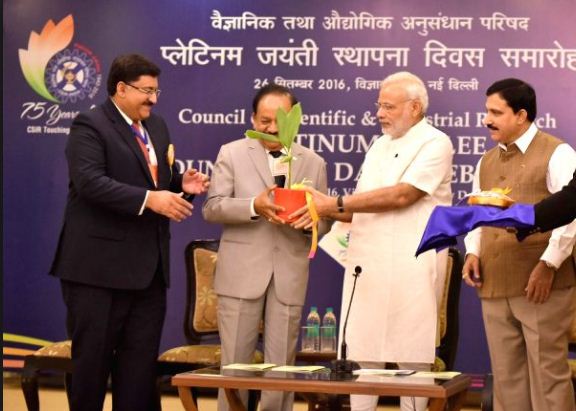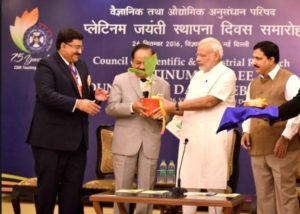Prime Minister Narendra Modi kicked off the platinum jubilee celebration of India’s largest civilian research and development agency Council of Scientific and Industrial Research, CSIR with an aim to push the institution to work more vigorously for bringing the result of its research, new technology and discoveries from lab to people and industries.
About CSIR:
Council of Scientific and Industrial Research(CSIR), established in 1942, is an autonomous body and the largest research and development (R&D) organisation in India. It runs 37 laboratories and 39 field stations or extension centres spread across the nation, with a collective staff of over 17000.
- Although it is mainly funded by the Ministry of Science and Technology, it operates as an autonomous body registered under the Registration of Societies Act of 1860.
- The research and development activities of CSIR includes aerospace engineering, Structural engineering, ocean sciences, Life sciences, metallurgy, chemicals, mining, food, petroleum, leather, and environment.
- In December 2006, Director General Raghunath A. Mashelkar, retired following which M. K. Bhan took over the post, but he was relieved on 7 March 2007. After that Ramasami had the additional charge of Director General of CSIR until Samir K. Brahmachari was appointed as the Director General on 13 November 2007.
- In late 2007, the Minister of Science and Technology, Kapil Sibal admitted, in a Question Hour session of the Parliament, that CSIR has developed 1,376 technologies/knowledge base during the last decade of the 20th century.
CSIR Achievements :
- Developed India’s first synthetic drug, Methaqualone in 1950.
- Developed first Indian tractor Swaraj in 1967 completely based on indigenous know-how.
- Achieved the first breakthrough of flowering of Bamboo within weeks as against twenty years in nature.
- First to analyze genetic diversity of the indigenous Andamanese tribes and to establish their origin out of Africa 60,000 years ago.
- Developed the first transgenic Drosophila model for drug screening for cancer in humans.
- First to introduce DNA finger printing in India.
- Helped India to be the first pioneer investor under the United Nations Convention on the Law of the Sea.
- Invented, once a week non-steroidal family planning pill Saheli and non-steroidal herbal pill for asthma called Asmon.
- Designed India’s first ever parallel processing computer Flo solver.
- Partnered more than 50,000 companies with turnover ranging from Rs 5 lakhsto Rs 500,000 crores.
- Rejuvenated India’s one-hundred-year-old refinery at Digboi using the most modern molecular distillation technology.
- Provided the critical technology for the NMP Lube Extraction Plant of capacity of 2,50,000 tonnes per year.
- With TCS, developed a versatile portable PC-based software ‘Bio-Suite’ for bioinformatics.
- Design of 14 seater plane ‘SARAS’.
Platinum Jubilee Celebrations :
The Prime Minister launched a mega plan to promote India’s traditional and Ayurvedic knowledge in a big way to bring scientific solutions to many health-related and other day-to-day problems.
- This event is considered as a catalyst to give a boost to the CSIR’s ongoing works which had in the past over seven decades come out with a number of inventions but could not translate most of it into real problem solver solutions.

- The year-long platinum jubilee celebration will culminate after completing 75 year of the CSIR in September, 2017. In the meantime, the institution’s various labs will organise many people-friendly events with an idea to promote science among youth and bring their works in public domain through industry-academia interactive sessions.
- It is noted that according to the latest Scimago Institutions ranking, the CSIR is the only government organization to have figured among the top 100 global institutions. It is, in fact, ranked 12th in the world among the government institutions.
7 New Plant Species :
During the event, Prime Minister Modi released seven new plant varieties developed at CSIR laboratories and also interacted with farmers of five states through video conferencing.
- The new varieties of the plants that have ornamental and medicinal qualities were developed by the CSIR laboratories, especially Cental Institute of Medicinal and Aromatic Plants (CIMAP).
- The Prime Minister also interacted with the farmers from Hyderabad in Andhra Pradesh, Cuddalore in Tamil Nadu, Jammu and Palampur in Himachal Pradesh.
- The plants include new varieties of lemongrass, citronella, vetiver and canna lily plant.






